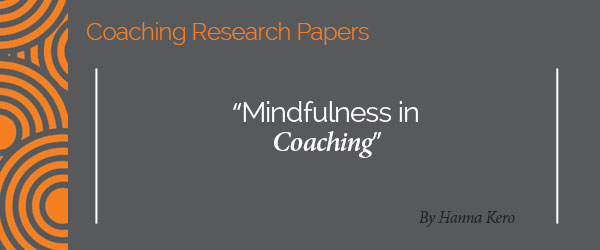 Research Paper By Hanna Kero
Research Paper By Hanna Kero
(Mindfulness Coach, FINLAND)
 Introduction
Introduction
This research paper focuses on the role of mindfulness in coaching. Mindfulness is a concept taken from a 2500 yr old tradition of Buddhist meditation practices and condensed into a simple technique that can be easily learned and applied[1]. During the past years, it has received a great deal of attention and more and more people from a wide range of disciplines are incorporating mindfulness in their work and personal lives. What we are witnessing can be described as mindfulness revolution: it is being talked about everywhere from classrooms to major organizations, book clubs to hospitals, prisons to spa retreats. Over the last 40 years, mindfulness has been the subject of much research. Thousands of research papers and articles have now been written on the applications of mindfulness, and its impacts on people’s lives. Still, there hasn’t been a lot of research done on the role of mindfulness in coaching, although more in other arenas with implications for coaching.
Preparing to write this research paper proved this to be true, since it took much effort to find proper sources for my assignment.
My own interest in mindfulness goes back several years to a time, when a health crisis prompted an interest in the mind-body connection. Since then, I have gradually developed a personal mindfulness practice, which is still continuing and evolving. My training in ICA has further convinced me about the transformational power of mindfulness both in personal and professional levels. I am convinced that mindfulness will gain even wider interest in the coming years and will also take the coaching profession to a whole new level.
Defining mindfulness
The term “mindfulness” has been used to refer to a psychological state of awareness, the practices that promote this awareness, a mode of processing information and a character trait. Mindfulness might best be described as a ‘way of being’ rather than a technique, but in psychological terms it can be taught as a technique to increase insight and alter our relationship with our thoughts.
As Passmore and Marianetti write in their article, mindfulness is composed by at least four elements: awareness, attention, time and acceptance. Awareness is the brain’s ability to constantly monitor and recognize internal and external systems and stimuli. Attention is the brain’s ability to focus the awareness to specific phenomenon and so increasing the sensitivity to it. Time refers to “the now”: the only place where we exist, experience and act. Acceptance represents our ability to let-go and to be non-judgemental; our ability to observe and absorb reality “as is”, without embarrassment, satisfaction or disappointment. In addition, according to Passmore and Marianetti, mindfulness can contribute towards increasing our ability to live a fuller life by allowing us to own our lives moment by moment, as they unfold, in joy and in pain, in our relationships with others and ourselves, in our private and professional lives (Passmore & Marianetti 2007).
Importance of coaches own personal mindfulness practice
As it has often been pointed out, mindfulness cannot be taught to others in an authentic way without the instructor’s practicing it in his or her own life. Jon Kabat-Zinn[2] has emphasized that mindfulness is a way of being that takes ongoing effort to develop and refine. He calls it both the work of a lifetime and, paradoxically, the work of no time at all – because its field is always this present moment in its fullness. The paradox can be understood and embodied only through sustained personal practice over days, weeks, months, and years (Jon Kabat-Zinn 2003).
Passmore and Marianetti also underline the importance of an on-going experience with mindfulness practice. Only through their own practice and understanding will the coach be able to guide the client. As Segal et. al.[3](2002) have said,
Swimming instructor is not someone who knows the physics of how solids behave in liquids, but he or she knows how to swim.
Learning to become more mindful is quite contradictional compared to other types of formal (academic) trainings. The aim is not to acquire as much knowledge, hard data or statistics as possible, but to learn about yourself; how your body and mind are connected and how they work, how to break free from automatic pilot, how to be present and experience each moment as it is. Also, the goal is not to “fix” unpleasant experiences, but rather to develop a skill to detach from unhelpful habits that are causing distress and preventing positive action. Doro Kiley sums up this well in her article:
Our mind is like a garden with every imaginable type of seed always ready to sprout. We have the power to choose which seeds we water and which ones we ignore or weed out. When we choose to cultivate seeds of loving friendliness, compassion and forgiveness and let go of the seeds of anger, resentment and greed then we are more able to cultivate a pleasing and peaceful mind.
Thus, mindfulness-based coaching is highly dependent on the coaches ability to become the “gardener” of his own mind first, before guiding clients along the same path.
According to professor Peter Hawkins, this work requires both greater depth of engagement from the coach as well as the calm, receptive centre that can listen with compassion, not just to the individual client but to the many levels of systems that comprise their world. In addition, Peter Hawkins emphasizes that it is important to always ask,
who is our mindfulness practice in service of ?
Hawkins reminds us of the fundamental meaning of mindfulness practice by saying that
If it is our self and we are making being mindful another acquisition, or trying to find the fastest escalator up Maslow’s pyramid of self-actualization, we are deluding ourselves and adding to the rampant individualism that is helping to degrade our planet. Expanding our own little being must ultimately be our own opening into the greater connection with Being, which is the ultimate home which we can re-enter here and now (Peter Hawkins, 2013).
Why practice mindfulness?
Mindfulness-based coaching has many benefits for both the coach and the client and their relationship. As mindfulness continues to spread in the world, there has been many studies done on its benefits. Mindfulness practices have shown to have positive effects in several different areas:
Practicing mindfulness benefits coaches by:
Suppose you read about a pill that you could take once a day to reduce anxiety and increase your contentment. Would you take it? Suppose further that the pill has a great variety of side effects, all of them good: increased self-esteem, empathy, and trust; it even improves memory. Suppose, finally, that the pill is all natural and costs nothing. Now would you take it? The pill exists. It’s called meditation.” ~Jonathan Haidt: The Happiness Hypothesis~
Other benefits of practicing mindfulness
Mindfulness in coaching: Breaking free from autopilot
Mindfulness-based coaching is a unique approach to creating lasting change and transformation. At the core of mindfulness-based coaching is awareness, which means that thoughts and emotions are observed as events in the mind, without over-identifying with them or reacting to them in an automatic, habitual ways. Increased awareness brings emotional resilience and strengthens the client’s ability to connect with their innate potential and resources for wellbeing. Mindfulness is the practice of awareness that makes the client feel “alive”. Feeling alive, in turn, is a result of learning to find the ‘space’ between one’s perceptions and one’s responses. In this way, mindfulness-based coaching helps clients to respond reflectively and intentionally to situations instead of reacting to them based on old, conditioned habits or reflexes.
Mindfulness in its most general sense is about waking up from a life on automatic, and being sensitive to novelty in our everyday experiences….Instead of being on automatic and mindless, mindfulness helps us awaken, and by reflecting on the mind we are enabled to make choices and thus change becomes possible.~ Dr. Daniel Siegel: The Mindful Brain ~
Mindfulness-based coaching focuses both in the client’s state of mind and their attitudes. The state of mind is
present-focused, non-judgemental, open-mindedness, and acceptance.
It is the opposite of being on ‘autopilot’, which for many of us is the ‘normal’ state of mind:
A pattern of behavior can become so habitual that one barely notices anymore what it prompts one to do. One feels automatically, thinks automatically and acts automatically. (Martine Batchelor, 2007)
Daniel Gilbert and Matthew Killingsworth confirmed in their study[4] that most of us are ‘mentally checked out’ almost half of the time, 46.9 % to be exact. Being on autopilot means that a person isn’t focused on the outside world or the task at hand but instead is consumed by his or her own thoughts. In essence, when being on an autopilot, we are physically present but our mind is wondering elsewhere. Sometimes coaching clients feel that their whole lives are running on an autopilot. Mindfulness coaching can stop this mental hi-jacking by teaching clients to direct (and re-direct) their attention towards the present moment. This, in turn, allows clients to gain greater access to their own inherent resources for intuition, insight, creativity and healing.
Mindfulness as an attitude can be compared to tuning your mind like a guitar, not too tight and not too loose. It means finding the balance between relaxation and alert attention and cultivating a curious, welcoming and gentle attitude towards ourselves, others and our experiences. To guide clients on their transformative journey from living on an autopilot to fully awakening to the richness of their lives, coaches must learn to know and understand themselves first. One cannot guide someone else on a path they haven’t even seen. Thus, a skilled coach must have a clear understanding of what growth, change and living fully present really mean on a deeper level. For coaches to achieve this type of awareness, they must first understand and know themselves. Gaining this type of self-awareness is a result of long term, first-hand experiences with mindfulness practice.
When a coach is fully present in his or her own life, aware of themselves and their impact on other people, they become more effective in understanding and helping their clients.
